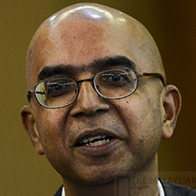
Rama Ramanathan, The Malaysian Insider
The job of Parliament is to ensure that the Cabinet, composed of the prime minister and ministers, carries out the will of the people. The Cabinet is supposed to carry out the will of the people by crafting policies and laws for approval by Parliament and by executing them under the supervision of Parliament.
 The parliament of Singapore is unicameral, whereas the Parliament of Malaysia is bicameral. That means Malaysia has a lower house (House of Representatives or Dewan Rakyat) and an upper house (Senate or Dewan Negara) to represent the people, make laws and monitor the Cabinet, whereas Singapore only has one house.
The parliament of Singapore is unicameral, whereas the Parliament of Malaysia is bicameral. That means Malaysia has a lower house (House of Representatives or Dewan Rakyat) and an upper house (Senate or Dewan Negara) to represent the people, make laws and monitor the Cabinet, whereas Singapore only has one house.
Why is there a difference between Malaysia and Singapore?
It's different because Malaysia is a Federation, while Singapore is a city-state.
In a bicameral system, all policies and laws, except "money bills," must be approved by both houses.
Typically, the lower house - the Dewan Rakyat - is composed of members (MPs) elected by citizens in largely self-governed, distinct geographical areas.
In Malaysia, states and Federal Territories are largely self-governed; so, they elect MPs to the lower house. Because the number of persons living in these areas varies, so does the number of MPs from each area.
For instance, the population of Johor is over 10 times as large as that of Perlis. Should Johor and Perlis have the same number of representatives in the Dewan Rakyat?
The Federal Constitution answered the question in 1957. The answer hinged on the principle of proportional representation.
Under that principle, areas with larger populations get more voices in Parliament, and thus more opportunity to influence national decisions.
That principle still applies. Presently, amongst the peninsular states, Johor has the largest number of representatives (26) and Perlis has the smallest number (3).
One of the dangers of states with larger populations having greater influence over national decisions is that factors other than size of the population may be ignored in decision making.
For instance, a policy to accept refugees crossing the Thailand/Malaysia border may put a greater burden on citizens in Perlis than on citizens in Johor. Residents of Perlis may suffer more.
Similarly, if we made an international commitment to stop cutting down our forests, state revenues will go down more in Pahang and less in Johor. Pahang may have to cut spending or raise land taxes; residents of Pahang will suffer more.
In a Federation, the Senate is designed to ensure that the interest of each area is carefully considered before national decisions are made.
In Malaysia, as in most other nations, the upper house (Senate) cannot reject decisions of the lower house; it can only delay them. But this still works as a strong incentive for the Cabinet to craft policies and laws which will not be delayed by the Senate.
The characteristics of a well-functioning Senate which I've alluded to above are not today's reality. The reality is different for many reasons. I'll list just five.
First, in 1963, when the Federation of Malaysia was created, Sabah and Sarawak were over-represented and Singapore was under-represented in the Dewan Rakyat - instead of in the Dewan Negara (Senate).
This was a tacit acknowledgement of the lack of electoral legitimacy on the part of Senators, whether they are "elected" (with no competition) by state governments or by the Federal government.
Second, Senators appointed by the Yang diPertuan Agong (actually proposed by the prime minister) vastly outnumber Senators from the states.
Decades ago, when there were only 11 states, there were to be 22 senators from the states and 16 appointed senators. Today, with 13 states and 4 Federal territories, there are 30 senators sent by the areas and 40 senators appointed by the Federal government.
Third, the government uses Senatorial appointments to put unelected persons - who cannot be punished by voters at elections - in Ministerial offices.
Fourth, the Cabinet bypasses parliament and works through ministerial dictates.
Fifth, though the constitution provides (Article 66), for the Senate to initiate Bills which may eventually become law, I'm not aware of the Senate ever having done so. Neither am I aware of any Bills defeated in the Senate.
The Senate was designed to be a tiger. It has neither roared nor taken prey because the ruling coalition practices "winner takes everything" politics, not politics which acknowledges the Cabinet is subject to Parliament; not the kind that works for compromise and the best satisfaction of the people's will.
What are Barisan Nasional and Pakatan Harapan's plans for the Senate? Will they misuse, terminate, revive or re-invent the Senate?


No comments:
Post a Comment
Note: Only a member of this blog may post a comment.